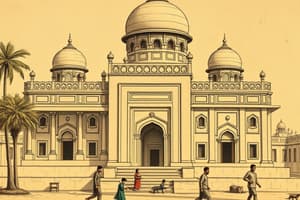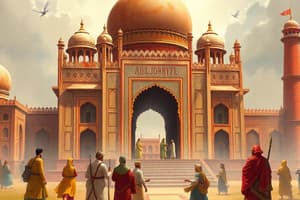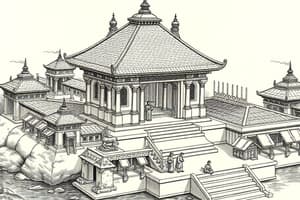Podcast
Questions and Answers
What is history the study of?
What is history the study of?
Past
Who is considered the first Greek historian?
Who is considered the first Greek historian?
Herodotus
What does 'AD' stand for in dates?
What does 'AD' stand for in dates?
Anno Domini
Where did 'Saka Samvat' commence?
Where did 'Saka Samvat' commence?
Who developed Carbon Dating?
Who developed Carbon Dating?
What does the 'Tripitaka' refer to?
What does the 'Tripitaka' refer to?
What is the Rig Veda known for?
What is the Rig Veda known for?
Which text deals with political life?
Which text deals with political life?
Who is the author of 'Ashtadhyayi'?
Who is the author of 'Ashtadhyayi'?
Who discovered the Harappan Civilization?
Who discovered the Harappan Civilization?
What does 'Satyameva Jayate' mean and where is it from?
What does 'Satyameva Jayate' mean and where is it from?
Who founded the Vikramshila Mahavihara?
Who founded the Vikramshila Mahavihara?
What are the silver coins of the Gupta period known as?
What are the silver coins of the Gupta period known as?
Who was known as the 'Napoleon of India'?
Who was known as the 'Napoleon of India'?
Which of these was a foreign traveler who first visited India?
Which of these was a foreign traveler who first visited India?
What is the capital of the Magadha kingdom known for opposing Alexander?
What is the capital of the Magadha kingdom known for opposing Alexander?
Alexander the Great was accompanied by the historian Herodotus.
Alexander the Great was accompanied by the historian Herodotus.
Flashcards are hidden until you start studying
Study Notes
Introduction to Indian History
- History studies the past; roots trace back to Greek historian Herodotus, known as the "Father of History".
- Key quotes: "History bases all its conclusion on rational evidence" (Herodotus), "History repeats itself" (Karl Marx).
- Terms: BC refers to British Council; AD stands for Anno Domini, meaning 'year of the Lord'.
- Saka Samvat initiated under King Kanishka; carbon dating technique developed by Williard Libby for fossils.
Historical Sources
- Rig Veda provides insights into early Vedic culture; Buddhist texts include Tripitaka and Jataka.
- Kautilya's Arthashastra discusses political life, while Kalhana's Rajtarangini chronicles historical events.
- Other notable works: Ashtadhyayi by Panini, Mahabhashya by Patanjali, Harshacharita by Banbhatta, and Vikramankacharita by Bilhana.
- Early historians like Megasthenes documented India, authoring "Indica"; Al Biruni accompanied Mahmud of Ghazni.
- Archaeological Survey of India established in 1861; Alexander Cunningham recognized as the "Father of Indian Archaeology".
- Daya Ram Sahani is credited with the first discovery of Harappan Civilization; Ashokan inscriptions decoded by James Princep.
Vedic Culture
- The phrase "Satyameva Jayate" in India's state emblem originates from Mundaka Upanishad, texts dedicated to philosophy.
- Patanjali is noted for expounding yoga philosophy; Manu Smriti outlines laws of ancient India.
- Gayatri Mantra composed by Vishnumitra; Aryan translates to "of good family".
- Purana language includes the terms sarga, pratisarga, vansa, manavantara, and varshamcharit.
- Jhelum river was historically known as Vitasta; King Porus opposed Alexander during his invasion.
- Magadha kingdom's early capital was Rajgiri; contemporary ruler of Alexander, Dharananda, followed by Udayin who made Patliputra the capital.
- Mahapadmananda was the founder of the Nanda dynasty; Takshasila was located between the Indus and Jhelum rivers.
Religious Movements
- Lord Buddha attained Mahaparinirvana in Kushinagar; his teachings focused on purity of thought and conduct.
- Vikramshila Mahavihara, a center for education, established by Dharmapala; Tripitaka written in Pali.
Gupta Period
- Srigupta recognized as the first known Gupta ruler; silver coins named Rupyaka.
- Samudragupta, dubbed the "Napoleon of India," conducted Ashwamedha Yajna.
- Chandragupta assumed the title of Vikramaditya; V.A. Smith credited Samudragupta with the title "Indian Napoleon".
Studying That Suits You
Use AI to generate personalized quizzes and flashcards to suit your learning preferences.




